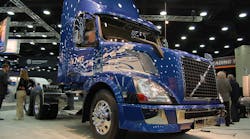Volvo, Mack forge LNG partnership with Shell
Volvo Trucks and brother company Mack Trucks formalized a collaboration and coordination partnership with global energy company Shell to help widen usage of liquefied natural gas (LNG) as a fuel for heavy-duty commercial vehicles – though both OEMs stress the deal is “non-exclusive” and so does not prevent them from working with other firms.
Göran Nyberg, president of Volvo Trucks North Americans sales & marketing, noted the partnership with Shell is also aimed at supporting the OEM’s introduction of a Volvo-branded LNG-fueled engine in 2014 – adding that the OEM currently offers a spark-ignited natural gas engine option for its Volvo VNM daycab, and will offer a similar option for its Volvo VNL daycab later this year.
“This agreement is part of our effort to collaborate with various stakeholders to ensure that the natural gas truck market is supported with the necessary infrastructure,” he added.
Volvo’s Ed Saxman noted during a press conference at the 2013 Mid America Trucking Show that the OEM’s LNG-fueled D-13 engine uses a compression ignition system, meaning it will use a small amount of diesel fuel “pilot injected” into the engine cylinder to “fire” the natural gas fuel.
The LNG-fueled D-13, which is currently in field trials, should also offer 10% to 20% better fuel economy compared to a similarly-sized compressed natural gas (CNG) powered spark-ignited model, he pointed out
“Compression ignition allows us to better control peak combustion which offering diesel engine-equivalent longevity, horsepower, and torque,” Saxman emphasized.
Kevin Flaherty, president of Mack Trucks North American sales & marketing, added that Mack recently rolled out a Pinnacle highway tractor model capable of running on LNG and plans to launch a natural gas-powered Granite vocational truck for the construction segment later this year.
Both models will be equipped with the Cummins Westport ISX12G spark-ignited engine, which can run on LNG as well as CNG, he said.
Both Volvo and Mack added that the agreement with Shell should help foster further collaboration on multiple issues regarding the use of natural gas as a trucking fuel, including emissions and fuel specification, as well as the general sharing of knowledge and experience.



